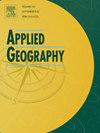Command and control governance in the 100 smart cities mission in India: Urban innovation or utopias?
IF 5.4
2区 地球科学
Q1 GEOGRAPHY
引用次数: 0
Abstract
Smart city technologies and platforms offer a mechanism to streamline decision-making and foster opportunities for sustainable urban innovation. However, they can also pose governance challenges, necessitate new municipal capacities, and limit the scope for public engagement. This study analyzes the development of 100 Integrated City Command and Control Centers (ICCC) through the Smart Cities Mission in India, which are assumed to unleash innovation in urban operations, service delivery, and disaster response. This study conducted a quantitative policy analysis to examine the investment and implementation patterns of these ICCC solutions, revealing the gaps between smart city visions and on-ground impacts. Several notable findings emerge: (a) ICCC platform architecture and their usage vary significantly across locations; (b) city size profoundly impacts the degree of adoption and successful execution of ICCCs; (c) cities utilizing ICCC platforms prioritize tech-driven mobility, surveillance, and utility domains over social and environmental sustainability; and (d) emerging smart city ICCC governance models encourage greater control of corporate entities in public affairs, creating new organizational management complexities. The in-depth insights add new knowledge to the debates on southern smart urbanism, decoding the role, opportunities, and challenges of these utopian digital platforms and their contribution to advancing smart cities and urban innovation.
印度100个智慧城市任务中的命令和控制治理:城市创新还是乌托邦?
智慧城市技术和平台提供了一种简化决策的机制,并为可持续的城市创新创造了机会。然而,它们也可能带来治理挑战,需要新的市政能力,并限制公众参与的范围。本研究通过印度的智慧城市任务分析了100个综合城市指挥与控制中心(ICCC)的发展,这些中心被认为将在城市运营、服务提供和灾难响应方面释放创新。本研究进行了定量政策分析,考察了这些ICCC解决方案的投资和实施模式,揭示了智慧城市愿景与实际影响之间的差距。出现了几个值得注意的发现:(a) ICCC平台架构及其使用情况在各地差别很大;(b)城市规模深刻影响国际公约的采纳程度和成功执行程度;(c)利用ICCC平台的城市优先考虑技术驱动的移动、监控和公用事业领域,而不是社会和环境的可持续性;(d)新兴的智慧城市ICCC治理模式鼓励企业实体在公共事务中加强控制,从而产生新的组织管理复杂性。这些深入的见解为南方智慧城市主义的辩论增添了新的知识,解读了这些乌托邦式数字平台的作用、机遇和挑战,以及它们对推进智慧城市和城市创新的贡献。
本文章由计算机程序翻译,如有差异,请以英文原文为准。
求助全文
约1分钟内获得全文
求助全文
来源期刊

Applied Geography
GEOGRAPHY-
CiteScore
8.00
自引率
2.00%
发文量
134
期刊介绍:
Applied Geography is a journal devoted to the publication of research which utilizes geographic approaches (human, physical, nature-society and GIScience) to resolve human problems that have a spatial dimension. These problems may be related to the assessment, management and allocation of the world physical and/or human resources. The underlying rationale of the journal is that only through a clear understanding of the relevant societal, physical, and coupled natural-humans systems can we resolve such problems. Papers are invited on any theme involving the application of geographical theory and methodology in the resolution of human problems.
 求助内容:
求助内容: 应助结果提醒方式:
应助结果提醒方式:


